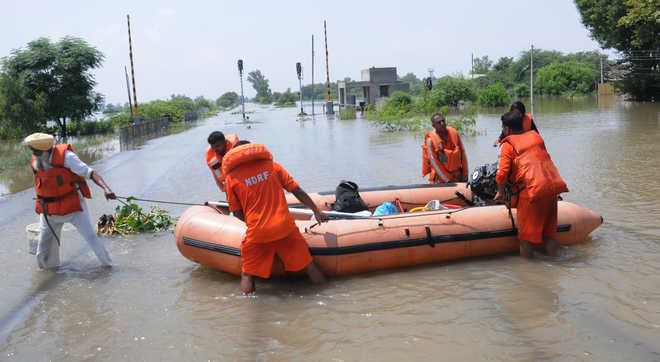Punjab’s worst floods in three decades have triggered a torrent of allegations. The state’s ruling as well as opposition parties have blamed the Bhakra Beas Management Board (BBMB) for the devastation suffered by several districts due to the release of excess water into the Sutlej river. The Shiromani Akali Dal has accused the Congress government of delaying flood protection work and failing to check illegal mining that hastened the erosion of river embankments, besides not taking appropriate action despite the BBMB’s warning on discharge from the Bhakra Dam. There is also a growing clamour for handing over the board’s control to Punjab so that the state’s interests could be safeguarded. On its part, the BBMB claims to have handled the situation caused by heavy rainfall in the ‘most professional’ manner by resorting to controlled water releases for ensuring the dam’s safety.
Amid the blame game, it is apparent that things spiralled out of control due to lack of coordination between the Punjab Government and the BBMB. The latter regulates the supply of water and power from the Bhakra-Nangal and Pong (Beas) dam projects to Punjab, Haryana, Rajasthan and Himachal Pradesh, with each having one member. ‘Inadequate’ representation on the board, constituted under the Punjab Reorganisation Act, 1966, has been the border state’s long-standing grouse. The BBMB had also been in the eye of the storm for opening the floodgates during the deluge of 1988, when Punjab was grappling with militancy. Falsely accused of aggravating the crisis, the then board chairman, Maj Gen BN Kumar, was gunned down by terrorists.
Having its ‘own man’ in charge of the BBMB is no long-term solution to Punjab’s flood-linked issues. The state should first set its own house in order. Pushed to the brink, the Capt Amarinder Singh government has decided to canalise all rivers with the technical help of the World Bank and the Asian Development Bank. However, an occasional crackdown on ecologically hazardous mining is not enough to wipe out the mafia that continues to enjoy political patronage. Sincere and sustained efforts are needed to fortify the ‘land of five rivers’ on the water front.









